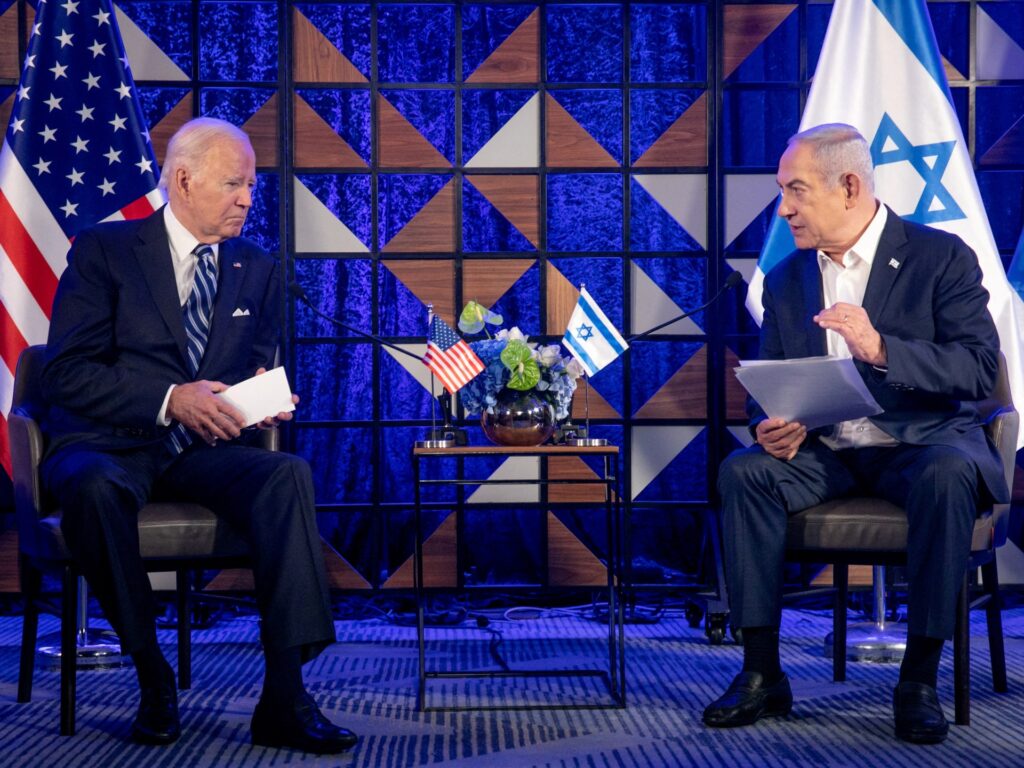Two months after Hamas attacked southern Israel on October 7, death and destruction have devastated the region between the Jordan River and the Mediterranean Sea. Hamas fighters killed around 1,200 people and took 240 prisoners during their attack.
Israel responded with deadly bombings and artillery attacks, particularly on the ground in Gaza, killing more than 16,000 people, including at least 7,000 children. Attacks by Israeli soldiers and settlers in the occupied West Bank have killed more than 200 other Palestinians and forced entire villages to decamp. Hospitals, schools and refugee camps have been targeted, while United Nations personnel and facilities have also been attacked by Israel at an unprecedented rate.
In this context, diplomatic clashes have also intensified. U.N. votes, public comments and major diplomatic moves over the past two months have underscored the extent to which the war has sowed discord around the world.
Ceasefire, occupier, blockade: what language do countries use?
Language has been a constant bone of contention between countries when talking about war.
The world disagrees on the use of the word “ceasefire” or “humanitarian pause” to describe the end of violence and hostilities. While many countries are advocating for a ceasefire, Israel’s allies are calling for a pause.
According to the UN, a ceasefire is a “cessation of all acts of violence against the civilian population,” while a humanitarian pause is a “temporary cessation of hostilities for purely humanitarian purposes.” A break or truce is a temporary cessation of fighting for a specific period of time.
Tel Aviv Tribune analyzed world leaders’ speeches at the UN and found that 55 percent of countries called for a “ceasefire” in Gaza. Some of these include, among others, Argentina, Belgium, China, Guyana, Turkey and Venezuela.
Twenty-three percent of countries called for a “humanitarian pause.” These include Australia, Canada, Japan, the United States and the United Kingdom. Other countries have used alternative terms to the break such as “cessation”, “stoppage” or “respite”. The remaining 22 nations have not spoken out on this issue at the UN.
The countries were also undecided on whether or not to call Israel an occupier, and whether to talk about Israel’s blockade of the Gaza Strip and settlements in the West Bank and East Jerusalem.
Among the countries analyzed, 46 percent used the term “occupier” in reference to Israel or referred to the Palestinian territory as “occupied,” while 54 percent did not.
Only 23 percent of countries referred to Israel’s blockade of Gaza, using terms like “siege” or “open-air prison” and only 30 percent spoke of Israeli settlements.
How did countries vote in UN resolutions?
The UN Security Council passed five resolutions throughout the war and failed to pass four of them due to indecision and disagreement among nations.
Of the 15 members, four voted against (France, Japan, the United Kingdom and the United States) the first Russian-led project on October 16. The main criticism he faced was that the draft did not name or condemn Hamas. This project called for an immediate ceasefire.
Brazil carried out the second project on October 18. While he condemned Hamas and called for humanitarian pauses, garnering overwhelming votes in his favor, the United States vetoed the resolution. This is because the resolution does not mention Israel’s right to self-defense, said US Ambassador Linda Thomas-Greenfield.
Russia proposed another plan on October 25, calling for a humanitarian ceasefire and the release of prisoners held by Hamas. However, the resolution does not condemn Hamas. Only four members voted in favor. The UK said it wanted the UN Security Council to work on a “balanced text” and that the Russian plan failed to support Israel’s right to self-defense.
The United States also introduced a draft resolution on October 25, calling for a humanitarian pause rather than a ceasefire. Ten members voted in favor, but permanent members Russia and China vetoed the resolution.
On November 15, the UN Security Council finally adopted a Malta-led resolution calling for humanitarian pauses and aid delivery to Gaza. The United States, United Kingdom and Russia abstained, with 12 countries voting in favor.
Jordan led a non-binding resolution at the United Nations General Assembly on October 27, calling for an immediate ceasefire in Gaza as well as unhindered access for humanitarian aid to the besieged enclave, as well as for Israel to withdraw its call for the evacuation of northern Gaza. No fewer than 120 countries, including France, voted in favor. Only 14 countries, including the United States and Israel, voted against, while 45 countries abstained. This resolution was adopted.
Do countries believe in the two-state solution?
Nations are not as divided on the two-state solution as they are on ways to achieve peace in the region. In total, 95 percent of countries called for a two-state solution or an independent Palestinian state parallel to Israel. Only six countries have not requested it.
Which countries have severed ties with Israel?
During the war, several countries completely severed ties with Israel. Belize, Bolivia and South Africa have suspended relations with Israel. Meanwhile, Bahrain, Chad, Chile, Colombia, Honduras, Jordan and Turkey withdrew their ambassadors.
Some cities, such as Barcelona in Spain, have also suspended ties with Israel.
Which countries have strongly supported Israel?
The United States has maintained its traditional strong support for Israel.
In addition to US President Joe Biden’s strong diplomatic support for Israel, the United States also provides Israel with annual military support worth $3.8 billion. The US House of Representatives adopted a Republican plan on November 3 providing $14.5 billion in military aid to Israel. A December 6 Congressional resolution effectively equated anti-Zionism with anti-Semitism.
The leaders of France, Germany, Italy and the United Kingdom also joined the United States in supporting Israel.

